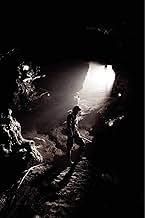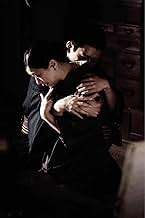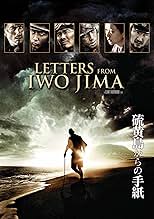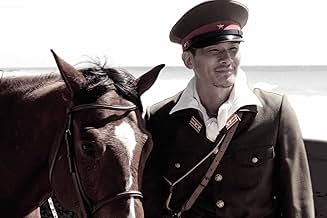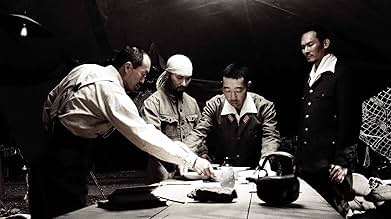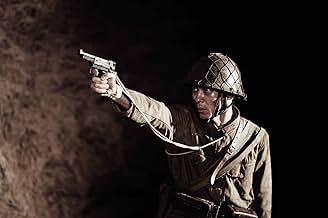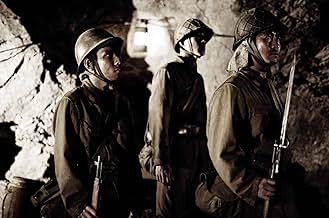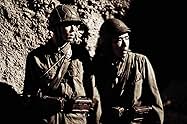A história da batalha de Iwo Jima entre os Estados Unidos e o Japão imperial durante a Segunda Guerra Mundial, contada sob a perspectiva dos japoneses que lutaram nela.A história da batalha de Iwo Jima entre os Estados Unidos e o Japão imperial durante a Segunda Guerra Mundial, contada sob a perspectiva dos japoneses que lutaram nela.A história da batalha de Iwo Jima entre os Estados Unidos e o Japão imperial durante a Segunda Guerra Mundial, contada sob a perspectiva dos japoneses que lutaram nela.
- Direção
- Roteiristas
- Artistas
- Ganhou 1 Oscar
- 25 vitórias e 39 indicações no total
Shidô Nakamura
- Lieutenant Itô
- (as Shidou Nakamura)
Luke Eberl
- Sam
- (as Lucas Elliot)
Sonny Saito
- Medic Endô
- (as Sonny Seiichi Saito)
Avaliações em destaque
The companion film to "Flags of Our Fathers" shows the battle of Iwo Jima from the Japanese point of view. Starting with the building of fortifications, hiding from relentless bombardment, and fending off an equally strong attack as American troops land on the island.
"Letters from Iwo Jima" just like "Flags of Our Fathers" is a first rate war movie with a relevant message with its critical nature. "Flags" showed the selling of war and "Letters" does the same, albeit with a different mind-set. Japan was an empire governed by a monarch back then so the military mentality was quite different, but it is also important to note the similarities. Especially at the base of the social pyramid where it is quite apparent that people are people no matter where you go.
Virtually all of the uber-patriotic tendencies that were rampant in Imperial Japan during WWII were also in Nazi Germany and, as both "Flags" and "Letters" demonstrate in the United States as well. People were used for the purpose of the government and were fed propaganda just the same. Maybe a different in a different form, but in the end it is all the same.
Ken Wantanbe is the film's highlight as a military man torn between his sense of duty and his inner feelings. As commander of the island he sees amongst his men the fanaticism, the pacifism, the "just do our job" crowd, and many other configurations of thought in between and mixed with the others. Even strange that some men initially want to fight and are proud to serve in the military and what's shocking is that some of their wives and mothers believe the same.
That paints a landscape of war as something amidst all of the stereotypes that have been made of it. Since that is where the truth usually lies, amidst all the gray matter. --- 9/10
Rated R: war violence/carnage
"Letters from Iwo Jima" just like "Flags of Our Fathers" is a first rate war movie with a relevant message with its critical nature. "Flags" showed the selling of war and "Letters" does the same, albeit with a different mind-set. Japan was an empire governed by a monarch back then so the military mentality was quite different, but it is also important to note the similarities. Especially at the base of the social pyramid where it is quite apparent that people are people no matter where you go.
Virtually all of the uber-patriotic tendencies that were rampant in Imperial Japan during WWII were also in Nazi Germany and, as both "Flags" and "Letters" demonstrate in the United States as well. People were used for the purpose of the government and were fed propaganda just the same. Maybe a different in a different form, but in the end it is all the same.
Ken Wantanbe is the film's highlight as a military man torn between his sense of duty and his inner feelings. As commander of the island he sees amongst his men the fanaticism, the pacifism, the "just do our job" crowd, and many other configurations of thought in between and mixed with the others. Even strange that some men initially want to fight and are proud to serve in the military and what's shocking is that some of their wives and mothers believe the same.
That paints a landscape of war as something amidst all of the stereotypes that have been made of it. Since that is where the truth usually lies, amidst all the gray matter. --- 9/10
Rated R: war violence/carnage
I had previously watched the violent battle of Iwo Jima in two good movies: 1949 "Sands of Iwo Jima" and more recently in "Flags of Our Fathers". In both features, we see very well-choreographed battle scenes disclosed from the North American point of view, with the "heroism" of the American troops and the personal drama of a couple of soldiers and families, in the usual unilateral formula to reach great box offices in USA. Further, in these two movies, the enemy is nothing but evil and threatening one dimension shadows, using weapons to kill the brave marines.
However, "Letters from Iwo Jima" gives a totally different approach of war, unusual in Hollywood: it shows the human side of the enemies. In this film, the Japanese are also human beings, with different culture where they are prepared to die with honor, but people that love and are loved by someone, have families, wives and children, and fear and suffer with the insanities of war. In this aspect, I liked very much the pacifist perspective given by Clint Eastwood for the same battle, opening the eyes and hearts of viewers that probably were not able to understand this side of the Japanese (and other people) in a war. My vote is eight.
Title (Brazil): "Cartas de Iwo Jima" ("Letters From Iwo Jima")
However, "Letters from Iwo Jima" gives a totally different approach of war, unusual in Hollywood: it shows the human side of the enemies. In this film, the Japanese are also human beings, with different culture where they are prepared to die with honor, but people that love and are loved by someone, have families, wives and children, and fear and suffer with the insanities of war. In this aspect, I liked very much the pacifist perspective given by Clint Eastwood for the same battle, opening the eyes and hearts of viewers that probably were not able to understand this side of the Japanese (and other people) in a war. My vote is eight.
Title (Brazil): "Cartas de Iwo Jima" ("Letters From Iwo Jima")
I was not one of those who was really taken with "Flags Of Our Fathers." I thought the story was rather lacklustre and lacking to be honest, and so had little interest in "Letters From Iwo Jima." This is the sort of sequel to "Flags" - or it might be better called a companion to "Flags." Both were directed by Clint Eastwood and "Letters" shows the story of the Battle of Iwo Jima from the Japanese perspective - and much to my surprise I liked this movie very much. It was, I thought, by far superior to "Flags."
Most American movies dealing with World War II in the Pacific do so from a specifically American perspective that portrays the Japanese in an unflattering light. That's understandable. In the context of World War II, after all, Japan was the enemy. But "Letters" takes a very personal and human look at the Japanese soldiers assigned to Iwo Jima's defence. To me, the point that was being made was how much alike the Japanese and the Americans were. Both were fighting for their countries; both had little knowledge of the other, and therefore had distorted views of the other; both were doing their duties as they understood it. And, of course, the movie is based on letters supposedly written by Japanese soldiers on Iwo Jima - addressed to wives and mothers and other family. This is a surprisingly sympathetic look at the Japanese, something I really wasn't expecting from Clint Eastwood.
The story focuses on Japanese General Tadamichi Kuribayashi, who commanded the Japanese defence of Iwo Jima. Kuribayashi was a man well acquainted with the United States, having lived there for two years on a military exchange, and he had no illusions about Japan's ability to win the war, largely seeing Iwo Jima as a suicide mission from which he wouldn't return. He's portrayed very well here by veteran Japanese actor Ken Watanabe. The movie is almost entirely in Japanese (except for some brief scenes that feature American soldiers) with subtitles, but - although I'm usually not big on subtitles - this didn't really distract me. They were appropriate to this movie and provided a sense of authenticity.
This isn't a "war movie" in the normal sense of the war. Although there are battle scenes (and some of it is mildly graphic) it is for the most part the personal stories of the Japanese soldiers that dominate. It's extremely well done, and deserves a lot of credit for showing a side of the Japanese soldier in World War II that's rarely shown. (8/10)
Most American movies dealing with World War II in the Pacific do so from a specifically American perspective that portrays the Japanese in an unflattering light. That's understandable. In the context of World War II, after all, Japan was the enemy. But "Letters" takes a very personal and human look at the Japanese soldiers assigned to Iwo Jima's defence. To me, the point that was being made was how much alike the Japanese and the Americans were. Both were fighting for their countries; both had little knowledge of the other, and therefore had distorted views of the other; both were doing their duties as they understood it. And, of course, the movie is based on letters supposedly written by Japanese soldiers on Iwo Jima - addressed to wives and mothers and other family. This is a surprisingly sympathetic look at the Japanese, something I really wasn't expecting from Clint Eastwood.
The story focuses on Japanese General Tadamichi Kuribayashi, who commanded the Japanese defence of Iwo Jima. Kuribayashi was a man well acquainted with the United States, having lived there for two years on a military exchange, and he had no illusions about Japan's ability to win the war, largely seeing Iwo Jima as a suicide mission from which he wouldn't return. He's portrayed very well here by veteran Japanese actor Ken Watanabe. The movie is almost entirely in Japanese (except for some brief scenes that feature American soldiers) with subtitles, but - although I'm usually not big on subtitles - this didn't really distract me. They were appropriate to this movie and provided a sense of authenticity.
This isn't a "war movie" in the normal sense of the war. Although there are battle scenes (and some of it is mildly graphic) it is for the most part the personal stories of the Japanese soldiers that dominate. It's extremely well done, and deserves a lot of credit for showing a side of the Japanese soldier in World War II that's rarely shown. (8/10)
Don't listen to the people who call this movie inaccurate or revisionist history.
The movie is accurate. There were people on both sides of the war who at times showed kindness.
Labeling all the Japanese soldiers as people who tortured POWS would be like saying all American soldiers in Vietnam killed and rape innocent Vietnamese. Or all American soldiers in Cuba tortured POWS from the wars in the Middle East. You can't group people together like that.
This movie shows better than any other film that there's really no good guys or bad guys when it comes to war. War is just pointless.
The movie is not supposed to be a documentary so the people who bash it for little details should go rent a documentary if thats what they want to see.
Also, Clint Eastwood deserves major credit for telling both sides of the war. Too many war movies always show the enemy as "heartless monsters" when it reality its never like that.
This is without a doubt the best movie of the year. Make sure you go see it.
The movie is accurate. There were people on both sides of the war who at times showed kindness.
Labeling all the Japanese soldiers as people who tortured POWS would be like saying all American soldiers in Vietnam killed and rape innocent Vietnamese. Or all American soldiers in Cuba tortured POWS from the wars in the Middle East. You can't group people together like that.
This movie shows better than any other film that there's really no good guys or bad guys when it comes to war. War is just pointless.
The movie is not supposed to be a documentary so the people who bash it for little details should go rent a documentary if thats what they want to see.
Also, Clint Eastwood deserves major credit for telling both sides of the war. Too many war movies always show the enemy as "heartless monsters" when it reality its never like that.
This is without a doubt the best movie of the year. Make sure you go see it.
Not having seen Flags of Our Fathers, I'll be unable to make any comparison to its companion-movie. Even on its own Letter to Iwo Jima could be seen as representing the new tendency to "humanise" what were until recently the traditional WW2 villains from an Anglosaxon point of view. History tends to be written by those on the winning side - hence, we have had decades of inhuman German war machines, cowardly Italians and unspeakably cruel Japanese. Now, over 60 years since WW2, it has become acceptable - nay, the done thing if you have a conscience, to humanise the losers and show even the winners as fallible and even individually despicable (***SPOILER:*** see the American soldier who shoots the two Japanese prisoners who've deliberately given themselves over. ***END OF SPOILER***). Letters to Iwo Jima clearly has its heart in the right place: it wants to be objective, above and beyond anything else. And it is. Japanese soldiers have mothers, adorable young pregnant wives in pretty kimonos and sons they write loving letters to. We empathise with them no less than we have with all those American soldiers in an endless string of war movies. Technically, Letters is a well-made movie. It's also genuinely moving in parts - you do end up caring for most of the main players. For my personal taste, though, it spells things out too much and too often. Still, for something produced by Mr Manipulative Spielberg and co-written by Paul "Crash" Haggis, I was impressed.
Você sabia?
- CuriosidadesShot back-to-back with A Conquista da Honra (2006).
- Erros de gravaçãoWhen the soldiers in the cave commit suicide they use what look like type 97 hand fragmentation grenades held close to their chests.
The point of most grenades is to send out numerous fragments as fast-flying projectiles killing those close by (a few yards) or seriously injuring those further away.
However, even though the soldiers are all standing a few feet apart, as each grenade explodes only the person holding it is affected.
- Citações
General Tadamichi Kuribayashi: If our children can live safely for one more day it would be worth the one more day that we defend this island.
- Trilhas sonorasString Quartet No.6, Op. 1-6, Hob. III-6, Mov.2
Composed by Joseph Haydn
At a party where Ken Watanabe participated
Principais escolhas
Faça login para avaliar e ver a lista de recomendações personalizadas
Detalhes
- Data de lançamento
- País de origem
- Centrais de atendimento oficiais
- Idiomas
- Também conhecido como
- Cartas desde Iwo Jima
- Locações de filme
- Empresas de produção
- Consulte mais créditos da empresa na IMDbPro
Bilheteria
- Orçamento
- US$ 19.000.000 (estimativa)
- Faturamento bruto nos EUA e Canadá
- US$ 13.756.082
- Fim de semana de estreia nos EUA e Canadá
- US$ 89.097
- 24 de dez. de 2006
- Faturamento bruto mundial
- US$ 68.673.228
- Tempo de duração
- 2 h 21 min(141 min)
- Cor
- Mixagem de som
- Proporção
- 2.39 : 1
Contribua para esta página
Sugerir uma alteração ou adicionar conteúdo ausente







